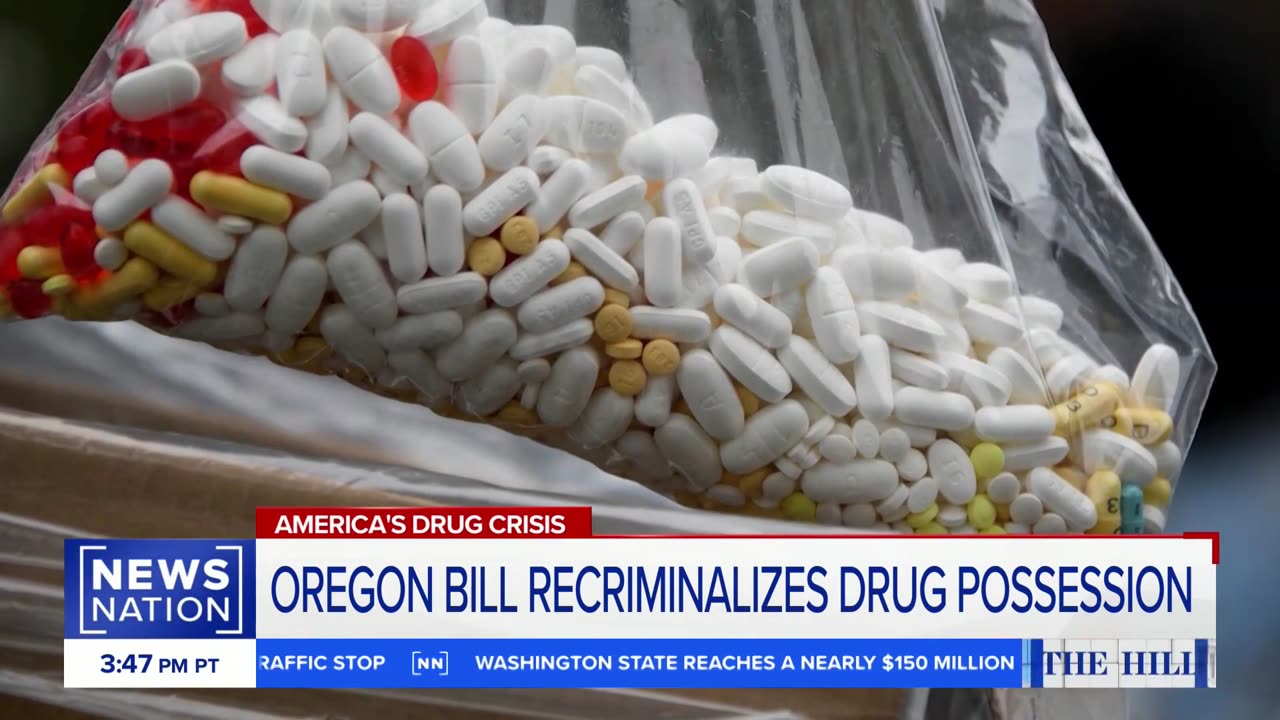Premium Only Content

Oregon Democrats consider recriminalizing drug use as overdose deaths continue to surge:
Oregon tried legalizing drugs. It didn't work. Oregon Democrats are backtracking on their support for the decriminalization of drugs after the past several years have not produced the promised results.
State Senate Majority Leader Kate Lieber has new legislation that will “recriminalize the possession of small amounts of drugs as a low-level misdemeanor, enabling police to confiscate them and crack down on their use on sidewalks and in parks,” according to the Associated Press. “It also aims to make it easier to prosecute dealers, to access addiction treatment medication, and to obtain and keep housing without facing discrimination for using that medication.”
The legislation, House Bill 4002, was introduced Tuesday, but the legislature has not posted a copy of the bill yet.
Republican legislators want more from the state – they “have proposed harsher sanctions for possession and other drug-related offenses, such as mandatory treatment and easing restrictions on placing people under the influence on holds in facilities such as hospitals if they pose a danger to themselves or others,” the AP reported.
It comes less than four years after voters in the liberal state passed Measure 110 with 58% of the vote. Voters in November 2020 “rejected charging drug users with criminal offenses, with voters passing a ballot measure that decriminalizes possession of heroin, methamphetamine, LSD, oxycodone and other hard drugs,” the Associated Press reported at the time.
The state changed its laws to focus on treatment and diverting drug users out of prison. However, 99% of people ticketed for drug use declined to seek treatment.
“Measure 110 directed the state’s cannabis tax revenue toward drug addiction treatment services while decriminalizing the possession of so-called ‘personal use’ amounts of illicit drugs,” the AP reported. “Possession of under a gram of heroin, for example, is only subject to a ticket and a maximum fine of $100.”
But most drug users declined to take advantage of an opportunity to get out of tickets by calling in for substance abuse help.
The AP reported:
Those caught with small amounts can have the citation dismissed by calling a 24-hour hotline to complete an addiction screening within 45 days, but those who don’t do a screening are not penalized for failing to pay the fine.
In the year after the law took effect in February 2021, only 1% of people who received citations for possession sought help via the hotline, state auditors found. As of last June, the hotline received an average of 10 calls per month that were related to citations.
But the possible changes would try a similar approach.
“Those arrested for small amounts would be referred by police to a peer support specialist to schedule an assessment or intervention,” the AP reported. “If the person shows up to the meeting, they wouldn’t be charged. If they don’t, the offense could be referred to the district attorney’s office.”
Legalizing drugs didn’t reduce use of drugs, state finds
A secretary of state audit on the effects of Measure 110, released at the end of 2023, found that making it easier to use drugs has not reduced the use of drugs.
“Rapid growth in fentanyl use, in overdose deaths, and in homeless populations has increased the need for treatment services promised under M110,” the report found.
Furthermore, the secretary of state report found:
The supply and use of the opioid fentanyl, potent and highly addictive, has exploded nationally and in Oregon. In Oregon and Idaho’s high intensity drug trafficking areas, the count of fentanyl pills seized increased from 690 in 2018 to 3,020,802 in 2022. Agents also seized 50 times more fentanyl in powder form in 2022 compared to 2018, an increase that adds millions of potentially fatal doses to the pill totals …
Fatal overdoses from opioid use in the state, which averaged 322 deaths per year in the five years prior to the pandemic, jumped nearly threefold to 955 deaths in 2022.
The report stated it could not conclude if making it easier for people to use drugs contributed to the increase in overdose deaths. “The growth in fentanyl use and overdoses has led to scrutiny of decriminalization’s role in these trends, a matter of continuing debate,” the audit stated. “Oregon data indicates fentanyl use and overdoses began surging two years before decriminalization took effect, and it may be too soon to say to what extent decriminalization has affected these last few years.”
Colorado has witnessed the problems of drug legalization
Making drugs easily available has led to problems not just in Oregon but in Colorado as well.
Denver Archbishop Samuel Aquila wrote a pastoral letter warning about the legalization of drugs in Colorado, which allows “medical” and “recreational” marijuana use.
“Unfortunately, addiction, mental illness, and homelessness are commonly experienced together,” he wrote in November 2023. “We cannot pretend that the legalization and growing cultural acceptance of drugs do not have disproportionate effects on the most vulnerable in our society. Not only that, but it is an assault on human dignity, taking advantage of the vulnerable for the sake of financial profit.”
At the same time, he called for treating people who are struggling with drug addiction to be treated with respect.
“While only a fraction of Catholics will ever work in drug rehab facilities, all of us can work to end the stigma that surrounds addiction by recognizing that it is a disease, being compassionate and honest with those who use drugs, and refusing to define anyone by their drug addiction but instead by their God-given identity,” he wrote.
“Additionally, many of us will support a loved one through the excruciating trial of addiction or provide encouragement to someone taking on that role.”
https://www.lifesitenews.com/news/oregon-democrats-consider-recriminalizing-drug-use-as-overdose-deaths-continue-to-surge/?utm_source=daily-usa-2024-01-26&utm_medium=email
-
 6:01
6:01
JUST A HOMELESS MAN
11 months agoTrump in 1999: Oprah would be my VP choice
193 -
 LIVE
LIVE
StevieTLIVE
3 hours agoWednesday Warzone Solo HYPE #1 Mullet on Rumble
182 watching -
 5:58
5:58
Mrgunsngear
4 hours ago $0.82 earnedBreaking: The New Republican Party Chairman Is Anti 2nd Amendment
13.8K5 -
 2:28:35
2:28:35
Geeks + Gamers
4 hours agoGeeks+Gamers Play- MARIO KART WORLD
18.6K -
![(8/27/2025) | SG Sits Down Again w/ Sam Anthony of [Your]News: Progress Reports on Securing "We The People" Citizen Journalism](https://1a-1791.com/video/fww1/d1/s8/6/G/L/3/c/GL3cz.0kob.1.jpg) 29:34
29:34
QNewsPatriot
4 hours ago(8/27/2025) | SG Sits Down Again w/ Sam Anthony of [Your]News: Progress Reports on Securing "We The People" Citizen Journalism
14.3K2 -
 25:12
25:12
Jasmin Laine
9 hours agoDanielle Smith’s EPIC Mic Drop Fact Check Leaves Crowd FROZEN—Poilievre FINISHES the Job
19.3K20 -
 11:33:26
11:33:26
ZWOGs
13 hours ago🔴LIVE IN 1440p! - SoT w/ Pudge & SBL, Ranch Sim w/ Maam & MadHouse, Warzone & More - Come Hang Out!
10.6K -
 LIVE
LIVE
This is the Ray Gaming
2 hours ago $0.01 earnedI'm Coming Home Coming Home Tell The World... | Rumble Premium Creator
24 watching -
 9:42:31
9:42:31
GrimmHollywood
11 hours ago🔴LIVE • GRIMM HOLLYWOOD • GEARS OF WAR RELOADED CUSTOMS • BRRRAP PACK •
7.56K -
 1:13:28
1:13:28
Glenn Greenwald
6 hours agoGlenn Takes Your Questions on the Minneapolis School Shooting, MTG & Thomas Massie VS AIPAC, and More | SYSTEM UPDATE #506
115K72